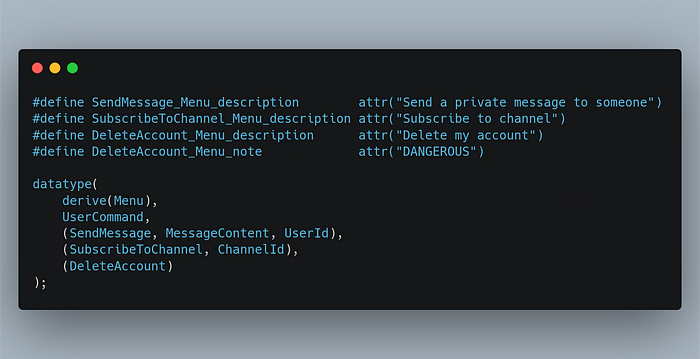
Recently I’ve published a blog post about Datatype99, a library implementing sum types in pure C99 with preprocessor macros only. Today I’m going to present its new metaprogramming ability: introspection of sum types at compilation time, also with preprocessor macros only.
First of all, what is type introspection? For our purposes, type introspection means the retrieval and manipulation of a type representation: imagine for a second that you could gather all variants of a sum type and automatically implement some interface for it! Sounds seditiously? Let me show you how you can achieve it.
Type the following:
datatype(
MyType,
(Foo, const char *),
(Bar, int, int)
);This code defines a sum type MyType with two variants: Foo and Bar . So far so good. Now our goal is to generate a function called MyType_say_hello which prints "hello" to stdout . This can be achieved via a deriver macro, a macro which accepts the representation of MyType and outputs something global for it, like a function definition:
#define DATATYPE99_DERIVE_SayHello_IMPL(name, variants) \
v(inline static void name##_say_hello(void) { puts("hello"); })And prepend derive(SayHello) to our datatype :
datatype(
derive(SayHello),
MyType,
(Foo, const char *),
(Bar, int, int)
);Finally, test MyType_say_hello :
int main(void) {
MyType_say_hello();
}This outputs hello , as expected. The DATATYPE99_DERIVE_SayHello_IMPL macro is written in Metalang99, an underlying metaprogramming framework upon which Datatype99 works. According to Metalang99, a Metalang99-compliant macro has the _IMPL postfix and results in one or more language expressions; here, the only expression is v(...) , which evaluates to ... . The parameters name, variants stand for the name of a sum type and a list of variants, respectively.
So how to manipulate this list of variants? The answer is: use Metalang99’s list manipulation metafunctions. Let’s do something more involved, for example, generating a pretty-printer:
#define DATATYPE99_DERIVE_Print_IMPL(name, variants) \
ML99_prefixedBlock( \
v(inline static void name##_print(name self, FILE *stream)), \
ML99_prefixedBlock( \
v(match(self)), \
ML99_listMapInPlace(ML99_compose(v(GEN_ARM), v(ML99_untuple)), v(variants))))#define GEN_ARM_IMPL(tag, sig) \
ML99_TERMS( \
DATATYPE99_assertAttrIsPresent(v(tag##_Print_fmt)), \
ML99_prefixedBlock( \
DATATYPE99_of(v(tag), ML99_indexedArgs(ML99_listLen(v(sig)))), \
ML99_invokeStmt(v(fprintf), v(stream), DATATYPE99_attrValue(v(tag##_Print_fmt)))))#define GEN_ARM_ARITY 1
Looks scary, ain’t it? 😳🙊😱😱🤭
Don’t panic, I’ll explain everything to you.
The ML99_prefixedBlock macro evaluates to prefix { your code... } , the ML99_invokeStmt macro evaluates to f(args...); , DATATYPE99_assertAttrIsPresent and DATATYPE99_attrValue are a means to deal with attributes (named arguments to a deriver): as you might have already guessed, the former simply asserts the presence of an attribute, and the latter extracts its value, respectively.
The heart of our deriver is ML99_listMapInPlace , which walks through all variants and calls GEN_ARM for each one. Notice that each variant is represented as a tuple, so in order to access its fields, one must untuple it; this is achieved by ML99_compose and ML99_untuple , a sort of functional programming!
As usual, define a sum type and test the new deriver:
#define Foo_Print_fmt attr("Foo(\"%s\")", *_0)
#define Bar_Print_fmt attr("Bar(%d, %d)", *_0, *_1)datatype(
derive(Print),
MyType,
(Foo, const char *),
(Bar, int, int)
);// `#undef`s omitted.../*
* Output:
*
* Foo("hello world")
* Bar(3, 5)
*/
int main(void) {
MyType_print(Foo("hello world"), stdout);
puts(""); MyType_print(Bar(3, 5), stdout);
puts("");
}
Works as expected either. Moving towards more sophisticated derivers, you can generate a command menu printer:
#define SendMessage_Menu_description attr("Send a private message to someone")
#define SubscribeToChannel_Menu_description attr("Subscribe to channel")
#define DeleteAccount_Menu_description attr("Delete my account")
#define DeleteAccount_Menu_note attr("DANGEROUS")datatype(
derive(Menu),
UserCommand,
(SendMessage, MessageContent, UserId),
(SubscribeToChannel, ChannelId),
(DeleteAccount)
);// `#undef`s omitted.../*
* Output:
*
* SendMessage: Send a private message to someone.
* SubscribeToChannel: Subscribe to channel.
* (DANGEROUS) DeleteAccount: Delete my account.
*/
int main(void) {
UserCommand_print_menu();
}
Or even reify the representation of variants into metadata variables:
datatype(
derive(Metadata),
Num,
(Char, char),
(Int, int),
(Double, double)
);/*
The generated metadata:static const VariantMetadata Num_variants_metadata[] = {
{.name = "Char", .arity = 1, .size = sizeof(NumChar)},
{.name = "Int", .arity = 1, .size = sizeof(NumInt)},
{.name = "Double", .arity = 1, .size = sizeof(NumDouble)},
};static const DatatypeMetadata Num_metadata = {
.name = "Num",
.variants = (const VariantMetadata *)&Num_variants_metadata,
.variants_count = 3,
};
*/
If you’re acquainted with Rust, you probably already know a plenty of use cases. Possible practical applications include strongly typed JSON (as in serde-json), strongly typed command-line arguments (as in CLAP), and even finite-state machine management (as in teloxide).
Of course, not only sum types can be introspected but also product types, more commonly known as record types, but Datatype99 doesn’t provide them at the time of publishing this post.
I hope you enjoyed this post and will give Datatype99 a try.
Support me on Patreon to motivate me to continue doing various meta-stuff with good old C.
